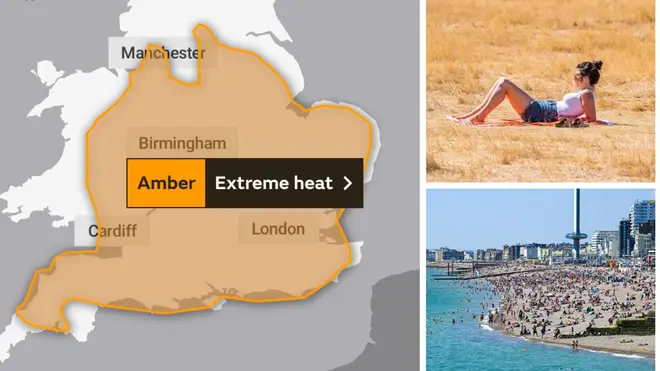
James O'Brien 10am - 1pm
9 August 2022, 10:23 | Updated: 9 August 2022, 15:11

An amber warning for extreme heat has been issued by the Met Office ahead of another week of soaring temperatures.
The warning began at midday and will end at 11pm on Sunday with impacts possible to health, transport and infrastructure.
And the Met Office's extreme heat warning, which covers much of the southern half of England as well as parts of eastern Wales, will be in force from Thursday through until the end of Sunday.
There is also an increased risk of water accidents and fires as more people visit coasts and beauty spots, the Met Office warned.
The heat will build through the week, peaking on Friday and Saturday thanks to the influence of high pressure positioned over the UK.
Temperatures will be highest across parts of England and Wales with these peaking on Friday and Saturday.
The Met Office says warmer temperatures, coupled with low rainfall, could lead to more illnesses - such as sunburn and heat exhaustion - and travel disruption.
It also warned adverse health effects are likely to be experienced by those vulnerable to extreme heat.
The amber warning is on top of a level three heat-health alert - which comes into effect at midday today and covers the whole of England.
Read more: Heatwave returns: Health chiefs issue level 3 alert ahead of 30C temperatures
Read more: 'We've had enough!': Nurses to vote on first ever strike in England and Wales
🔶 Amber extreme heat warning issued 🔶
— Met Office (@metoffice) August 9, 2022
Extreme heat warning issued across parts of England and Wales
Thursday 0000 - Sunday 2359
Latest info 👉 https://t.co/QwDLMfRBfs
Stay #WeatherAware⚠️ pic.twitter.com/L3p9rFqxfk
The UK Health Security Agency issued the level three alert for southern and central England from Tuesday to Saturday, with experts advising people to look out for those who are older or with existing health conditions, and young children.
Temperatures are expected to hit highs of above 30C in central and southern parts of the UK - but will not be as extreme as the record-breaking 40C heat in July, the Met Office said.
The national weather service said there is an increased chance some heat-sensitive systems and equipment may fail, and warned some changes in working practices and daily routines may be required.
The latest heatwave follows months of low rainfall, leaving places tinder-dry and sparking devastating wildfires across the UK.

James O'Brien: State of water infrastructure absolutely inevitable result of deregulation
Two water companies have introduced hosepipe bans including Southern Water which affected 935,000 from last Friday, and others are encouraging consumers to be mindful of their water usage.
The National Drought Group moved England into "Prolonged Dry Weather" status, which is the final stage before an official drought, at an emergency meeting last month.

According to the Met Office, July 2022 was the driest July for England since 1935, with England getting just 35% of its average rainfall for the month, and Wales 53%.
Scientists warn that the likelihood of droughts occurring is becoming higher due to climate change, driven by greenhouse gas emissions from burning fossil fuels and other human activities.
Climate change is also making heatwaves more intense, frequent and likely - with last month's record temperatures made at least 10 times more likely because of global warming, and "virtually impossible" without it, research shows.